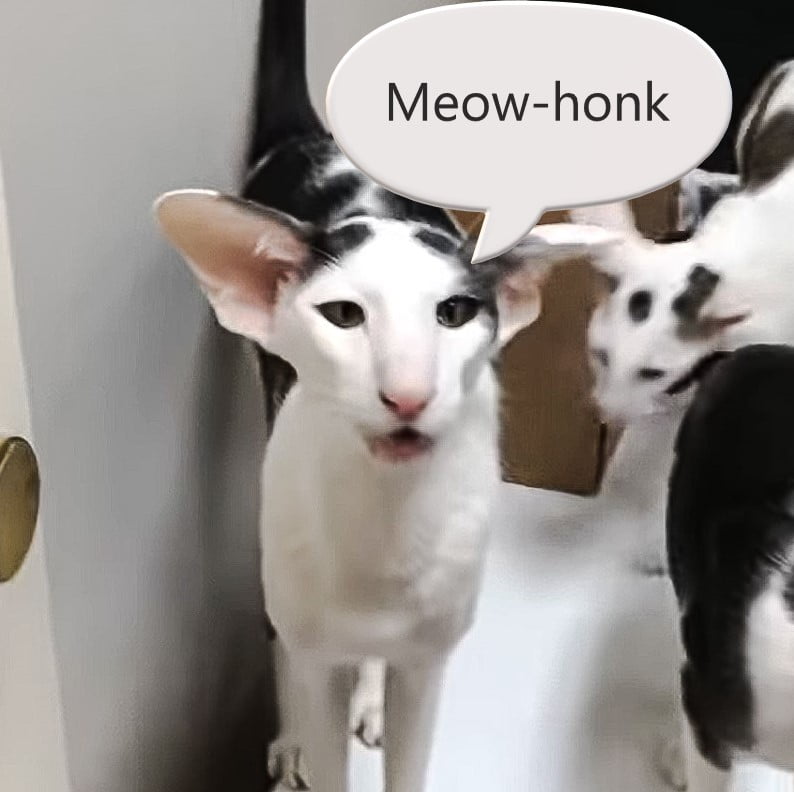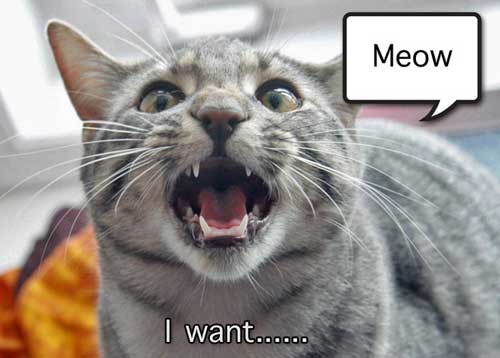If you compare the meow of the domestic cat’s wildcat ancestor to that of the domestic cat today you will notice a difference. Over 10,000 years of domestication the domestic cat meow has evolved to better communicate with human caregivers. And in response, humans have evolved as well in order to be more sensitive to the domestic cat’s meow (miaow) and what it means.

The latest evolution in the meow which you might hear produced by some domestic cats is the inclusion of hints of a baby crying. In fact, some domestic cats’ meow sounds are exactly like a baby crying but in other domestic cats there may be a hint of it. I believe that this is a further evolution by the domestic cat to make their meow more effective.
You will find on the Internet that some people ask “Why is my cat sound like a baby?” The answer is because it is more effective in getting their way. It appears to me that domestic cats learned to create this type of meow by observing the urgent and committed human reactions to babies crying.
The cat’s purr has also evolved to one which ‘solicits’ attention. It is a purr which is a request. Click this to read about it.
The meow is a request for attention. It is the most common sound to emanate from domestic cats. It says different things in different context but the basic message is “I require your immediate attention”. It is most commonly used to ask for food.

THERE ARE MORE MEOW ARTICLES AT THE BASE OF THE PAGE.
It originates in the tiny meowing sound of kittens calling out to their mother to let them know that they need help. In the domestic cat’s wildcat ancestor, the meow more or less disappears when they become an adult. However, in domestic cats it persists throughout their life because, it is argued, the adult domestic cat is kept in a permanent state of pseudo-kittenhood because of the relationship between them and their human caregiver.
It is as if they have a permanent mother looking after them which suppresses their need and desire to become independent adults. Adult domestic cats act as pseudo-kittens and this affects the way they vocalise.
Domestic cats have a range of meows which they modify to suit various occasions. For example, there is the meow which is a form of begging and which may include the baby sound for added emphasis. There are anxious meows and complaining meows. You might have heard the complaining meow.
My cat does it when I have to get up when watching television and he is on my lap. He does not want me to get up and complains. In fact, he complains quite a lot because ours is a relationship of equals which gives him the confidence to state his case and complain when he feels he must.

Sometimes domestic cats make soft flat meows to be let out of the house and a pitiful drawn-out meow to be let in again, if it starts to rain.
And when you are in the kitchen preparing food for them there is an expectant meow. You might have heard the meow indicating irritation. There is a distinct difference in tone which gets the message across. This is a reminder to us, too, that humans have developed a sensitivity to the variations in the domestic cat meow. This is a two-way evolutionary process: both caregiver and cat have evolved.
One Twitter user said in exasperation: “Daisy, our family cat and emotional support pet who is driving me crazy because she sounds like a baby or howls 99% of the time. It was hell when I had a newborn & couldn’t tell if it was cat or baby.”
And another tweeted: “There’s a stray cat outside my window. It sounds like a baby. Moer!”

A study (see below) confirms that humans find the meow of their feline companions more pleasant than the meows of the domestic cat ancestor, the North African wildcat.
The scientists state in their summary: “Both the acoustic and perceptual comparisons revealed clear species-level differences: the domestic cat meows were significantly shorter in mean duration than the wild cat meows, showed higher mean formant [see definiton below] frequencies, and exhibited higher mean fundamental frequencies”.
Humans rated domestic cat meows “as far more pleasant sounding than wild cat vocalisations.”
What they are they saying is that there has been 10,000 years of pressure on the domestic cat to modify their meows to get their human companions to better understand their demands. And within that evolution, as mentioned, the cat has learned to sound like a baby for the obvious reason that humans respond very productively and immediately to such a sound.
The study referred to: Perceptual and Acoustic Evidence for Species-Level Differences in Meow Vocalizations by Domestic Cats (Felis catus) and African Wild Cats (Felis silvestris lybica).
Definition of formant. : a characteristic component of the quality of a speech sound, specifically any of several resonance bands held to determine the phonetic quality of a vowel.

